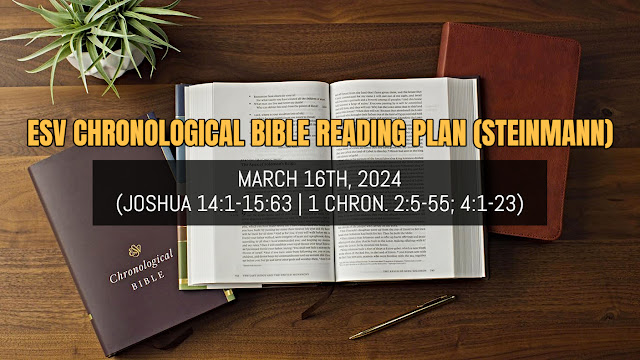LOOK | WHAT DOES IT SAY?
THINK | WHAT DOES IT MEAN?
(A) Teaching about fairness. Just by reading these lists, you can see the land that God divided up for Israel by lot wasn't divided equally. More and better land was given to some tribes (more on that in a minute), and a smaller and less desirable portion of land was assigned to others. The temptation here for some tribes would have been to look over at the lands received by other tribes and to complain. But the truth is that God had adequately provided for everyone. In the words of one famous comedian, speaking in a more serious moment, "The only time you look in your neighbor's bowl is to make sure that they have enough. You don't look in your neighbor's bowl to see if you have as much as them."
(B) Love for the foreigner. Caleb the son of Jephunneh the Kenizzite, the only man besides Joshua to live throughout the entire journey in the wilderness and enter the Promised Land (Numbers 32:12), and the man who led the tribe of Judah during that time (Numbers 34:18-19), was not an Israelite. He was actually a Canaanite (see Genesis 15:19; Numbers 32:12; Joshua 14:14). For unknown reasons, Salmon the son of Nahshon "the prince of the sons of Judah" (1 Chronicles 2:10) was not a leader of the tribe in those days, and so the tribe of Judah selected this foreign Canaanite man and elevated him up to the place of leader in their midst as one of their own, sometime between Numbers 10:14 and Numbers 13:6. This man left his home and heritage to worship God and be united to his purpose, and God moved the hearts of the people to prophetically elevate his testimony within the literal family of Jesus. The account of Joshua 14:6-15 proves that for all those who are far off, if they unite themselves to God, they too will be given a portion in the Kingdom of God. It also shows us, as God's people, that we are not to consider anyone to be an "outsider" because they don't share our background: After all, the most faithful Israelite, besides Joshua, was Caleb the Canaanite.
(C) Jesus is hidden in the boring parts of the story. At this time in history, Judah was just another tribe of Israel, led by a man who was not even an Israelite. The prophecy of the Promised Deliverer throughout Genesis, who was foretold in Genesis 49 to descend from the line of Judah, did not seem to be likely to come any time in the future. But then we have this list of the portioning out of the land in today's reading. And do you know who God overwhelmingly blesses, over and above the other tribes? The tribe of Judah. In the words of Richard Pratt, "Judah received more land than any other tribe. This list draws attention to the far-reaching boundaries within which every family of Judah received its portion... Our author continues to exalt Judah by noting that a total of 112 cities were given to Judah’s clans. He also repeats ten times that Judah received 'cities with their villages,' cities that were large enough to have villages around them (15:32, 36, 41, 44, 51, 54, 57, 59, 60, 62; see also 18:24, 28; 19:6, 7, 15, 16, 22, 23, 30, 31, 38, 39, 48). He does this to raise Judah’s profile as the tribe that the Lord blessed beyond measure (see 24:2–13)." Included in this inheritance was the city of Hebron, where the patriarchs and matriarchs of Israel were buried. It was big enough to be its own country, and eventually that's what it became. This was obviously the land of the leading tribe of Israel--though Joshua of the tribe of Ephraim was leading at this time. This was God's way of showing that he was still working to bring the Promised Deliverer to the world out of the tribe of Judah.
RESPOND | WHAT IS OUR PART?
How can we respond in our worship, attitude, and actions? In our attitudes we can apply this reading to ourselves. (A) We can be thankful for the things that God has blessed us with, and choose not to be jealous of how God has blessed someone else. (B) We can accept those who are outsiders, not only as people in our midst to be thrown some care to every once in a while, but as those who might even teach, bless, and challenge us as leaders in our midst. (C) We can be encouraged that God works in the details. Even when it seems like the world is going one way, God is at work to bring things around to his purposes.
PRAY | HOW DOES THIS LEAD US TO CONNECT WITH GOD?
For the last few days, we've explored a few different formats for prayer. I liked this one so much that I wanted to use it again, one more time, before we move on to the next.
C = Confess. Confess your trust in God, and your need for him.
A = Ask. Ask God to move--there is nothing that he can't do.
L = Love. Thank God for the many ways that he shown his providential grace.
L = Listen. Ask God to bring to mind a necessary word (thought, Scripture, idea) for you today.


No comments:
Post a Comment
Enter into the conversation! No anonymous comments.